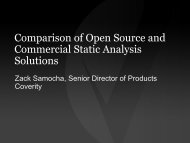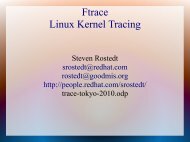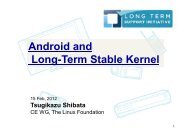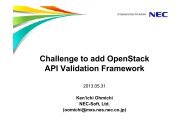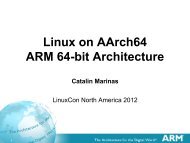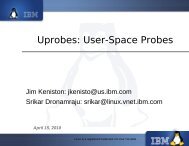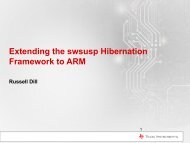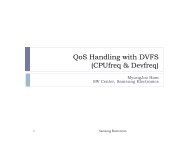direct reclaim - The Linux Foundation
direct reclaim - The Linux Foundation
direct reclaim - The Linux Foundation
You also want an ePaper? Increase the reach of your titles
YUMPU automatically turns print PDFs into web optimized ePapers that Google loves.
Reducing Memory<br />
Access Latency<br />
Satoru Moriya <br />
<strong>Linux</strong> Technology Center<br />
Yokohama Research Lab.<br />
Hitachi, Ltd<br />
Copyright (c) 2013 Hitachi LTD., Systems Development Lab. All right reserved
Contents<br />
1. Introduction<br />
2. Issues<br />
3. solution<br />
Copyright (c) 2013 Hitachi LTD., Systems Development Lab. All right reserved<br />
2
1. Introduction<br />
Copyright (c) 2013 Hitachi LTD., Systems Development Lab. All right reserved
1-1<br />
Background<br />
• Hitachi focuses its business on<br />
– Enterprise system<br />
• Stock exchange system, banking system, etc.<br />
– IT systems backing social infrastructure<br />
• Train control system, plant control system, etc.<br />
– Highly reliable cloud<br />
• Some of them require very low latency<br />
– Latency order<br />
• Depend on each system (e.g. 1 msec/transaction)<br />
– Determinism<br />
• In those systems, there are time limits and we should not run<br />
past it at any time (target: soft realtime)<br />
• Minimizing worst latency<br />
– Every process keeps to the time limit<br />
Copyright (c) 2013 Hitachi LTD., Systems Development Lab. All right reserved<br />
4
1-2<br />
Background – cont.<br />
• Standard system<br />
– Optimized for best average (throughput)<br />
• We have to tune/change systems to get<br />
required latency<br />
– Entire system<br />
• Hardware, firmware, OS, middleware & applications<br />
– OS<br />
• Cpu, memory, network, IRQ, etc.<br />
This presentation focuses on latency in<br />
memory management area<br />
Copyright (c) 2013 Hitachi LTD., Systems Development Lab. All right reserved<br />
5
1-3<br />
Our Goal of mm Improvement<br />
• Make the worst memory access latency less<br />
than 1 msec<br />
# Kind of pages Sensitive<br />
for delay<br />
1 filebacked<br />
unmapped N<br />
2 mapped Y<br />
3 anonymous Y<br />
detail<br />
Pages are pagecache and so users think access delay due to<br />
I/O is acceptable because applications issue I/O explicitly<br />
when they access the data which is included in these pages.<br />
Pages are mapped to process’s memory space – e.g. library<br />
page etc.<br />
Users don’t accept access delay because application doesn’t<br />
issue I/O explicitly when they access the data which is<br />
included in these pages.-(*)<br />
Pages are allocated by applications. Users don’t accept<br />
access delay because (*).<br />
This talk focuses on access latency to<br />
“anonymous pages”<br />
Copyright (c) 2013 Hitachi LTD., Systems Development Lab. All right reserved<br />
6
2. Issues<br />
Copyright (c) 2013 Hitachi LTD., Systems Development Lab. All right reserved
2-1<br />
Issues<br />
• <strong>Linux</strong> uses free memory for pagecache as much as<br />
possible<br />
<strong>Linux</strong> memory management<br />
Kernel/process/cache<br />
used<br />
cache (clean/dirty)<br />
•If an application allocates/accesses a new page…<br />
•<strong>The</strong> kernel <strong>reclaim</strong>s memory and then allocates memory (<strong>direct</strong> <strong>reclaim</strong>)<br />
•<strong>The</strong> kernel may <strong>reclaim</strong> anon pages (swapout/swapin)<br />
• 2 issues for memory access latency<br />
– Reclaim in page alloc path (<strong>direct</strong> <strong>reclaim</strong>)<br />
• It takes some time<br />
• May need I/O<br />
– swapout/swapin<br />
• Put out anon pages to disk<br />
• Need I/O to read data from disk at next access<br />
Copyright (c) 2013 Hitachi LTD., Systems Development Lab. All right reserved<br />
8
2-2<br />
Direct <strong>reclaim</strong><br />
• If <strong>Linux</strong> runs short of memory, it <strong>reclaim</strong>s used pages<br />
and then allocate new pages<br />
• <strong>The</strong>re are 2 type of <strong>reclaim</strong><br />
– Background <strong>reclaim</strong> (kswapd)<br />
– Foreground <strong>reclaim</strong> (<strong>direct</strong> <strong>reclaim</strong>)<br />
• Reclaim pages in process’s context<br />
Memory Access (Page fault) Flow<br />
page fault<br />
(alloc mem)<br />
free memory<br />
Y<br />
No delay<br />
Page<br />
<strong>reclaim</strong>ing<br />
N<br />
Background<br />
<strong>reclaim</strong><br />
Enough<br />
memory<br />
No delay<br />
Not<br />
enough<br />
Direct <strong>reclaim</strong><br />
delay<br />
Copyright (c) 2013 Hitachi LTD., Systems Development Lab. All right reserved<br />
9
2-3<br />
swapout/swapin<br />
• Anon pages may be <strong>reclaim</strong>ed even if there are enough<br />
pagecache pages<br />
• /proc/sys/vm/swappiness<br />
– We can configure how aggressive the kernel will swap anon pages<br />
– Anon pages can’t avoid to be swapped out even if swappiness = 0<br />
• When applications access the memory region which was<br />
swapped out, the kernel has to swap in necessary pages<br />
How to get anon/filebacked scan ratio<br />
Memory Access Flow<br />
1. ap = (swappiness+1) * (scanned+1)/(rotated+1)<br />
fp = (200 – swappiness) * (scanned+1)/(rotated+1)<br />
2. anon = ap / ap + fp + 1<br />
file = fp / ap + fp + 1<br />
3. nr_scan_anon = (anon_lru_length >> priority) * anon<br />
nr_scan_file = (file_lru_length >> priority) * file<br />
access<br />
memory<br />
Page fault<br />
Swapped<br />
out<br />
Y<br />
Allocate<br />
memory<br />
N<br />
No delay<br />
Delay<br />
(<strong>direct</strong> <strong>reclaim</strong>)<br />
In some situation, nr_scan_anon is not zero<br />
and so anonymous pages may be <strong>reclaim</strong>ed<br />
Read from<br />
swap space<br />
delay<br />
Copyright (c) 2013 Hitachi LTD., Systems Development Lab. All right reserved<br />
10
2-4<br />
Current Solution (1)<br />
• Preallocation + mlock(2)/mlockall(2)<br />
– Preallocate and call mlock/mlockall before starting<br />
critical sections<br />
– Ensure that necessary pages are resident in RAM<br />
– Avoid page allocation and <strong>reclaim</strong> during critical<br />
sections<br />
= Avoid delay<br />
It needs to change application<br />
Sometimes, we can’t do it…..<br />
Copyright (c) 2013 Hitachi LTD., Systems Development Lab. All right reserved<br />
11
2-5<br />
Current Solution (2)<br />
• cgroup (memcg)<br />
– Create a memcg<br />
– Set a max limit (memory.limit_in_bytes)<br />
– Put processes which consume pagecache (e.g. back<br />
up process etc.) into it<br />
If the process which has latency critical sections increases<br />
pagecache, this solution may not work…. because current<br />
memcg doesn’t have background <strong>reclaim</strong><br />
This solution doesn’t help swapout/swapin issue<br />
Copyright (c) 2013 Hitachi LTD., Systems Development Lab. All right reserved<br />
12
2-4<br />
Solution in UNIX<br />
• Commercial UNIX has pagecache limitation feature<br />
– It saves free memory by limiting the amount of cache<br />
Without cache limitation<br />
With cache limitation<br />
used<br />
Kernel/process/cache Kernel/process cache<br />
cache (clean/dirty)<br />
•Reclaim cache or anonpage (swapout)<br />
and then allocate memory<br />
•Reclaiming memory may cause delay<br />
•Reclaiming anonpage may cause delay<br />
used<br />
Cache Limitation<br />
free<br />
cache<br />
(clean/dirty)<br />
•Reclaim cache only<br />
•Keep free memory and just allocate<br />
memory from it<br />
•Avoid delay<br />
• Some enterprise users really want the feature because they use it in their current<br />
system<br />
• This feature was proposed to the kernel community several times. But it has not<br />
been accepted yet.<br />
• 2007: Limit the size of the pagecache<br />
• http://lwn.net/Articles/218890/<br />
• 2011: Unmapped page cache control<br />
• https://lkml.org/lkml/2011/3/30/10<br />
13<br />
Copyright (c) 2013 Hitachi LTD., Systems Development Lab. All right reserved
2-4<br />
Solution in UNIX<br />
• Commercial UNIX has pagecache limitation feature<br />
– It saves free memory by limiting the amount of cache<br />
Without cache limitation<br />
With cache limitation<br />
Cache Limitation<br />
Kernel/process/cache Kernel/process cache<br />
used We need cache (clean/dirty) to take other used approach…<br />
free<br />
cache<br />
(clean/dirty)<br />
•Reclaim cache or anonpage (swapout)<br />
and then allocate memory<br />
•Reclaiming memory may cause delay<br />
•Reclaiming anonpage may cause delay<br />
•Reclaim cache only<br />
•Keep free memory and just allocate<br />
memory from it<br />
•Avoid delay<br />
• This feature was proposed to the kernel community several times.<br />
But it has not been accepted yet.<br />
• 2007: Needs/reasons were not discussed well.<br />
• http://kerneltrap.org/mailarchive/linux-kernel/2007/1/24/47350<br />
• 2010: Implement issue (Too big negative impact on fast path)<br />
• https://lkml.org/lkml/2011/3/30/10<br />
Copyright (c) 2013 Hitachi LTD., Systems Development Lab. All right reserved<br />
14
3. Solution<br />
Copyright (c) 2013 Hitachi LTD., Systems Development Lab. All right reserved
3-1<br />
Approach in <strong>Linux</strong><br />
• Issues<br />
– Direct <strong>reclaim</strong><br />
• Reclaim pages in page alloc path<br />
• May need I/O<br />
– swapout/swapin<br />
• Put out anon pages to disk<br />
• Need I/O to read data from disk at next access<br />
• Issuing I/O in memory access path causes<br />
huge latency<br />
We need to avoid I/O in memory access path<br />
Copyright (c) 2013 Hitachi LTD., Systems Development Lab. All right reserved<br />
16
3-2<br />
Avoid I/O in <strong>direct</strong> <strong>reclaim</strong><br />
• Issue<br />
– Huge latency is caused when the kernel writebacks in<br />
<strong>direct</strong> <strong>reclaim</strong><br />
• Solution<br />
– Avoid writeback in <strong>direct</strong> reclalim<br />
= <strong>reclaim</strong> only clean pages in <strong>direct</strong> <strong>reclaim</strong><br />
– <strong>The</strong> patch was proposed by Mel Gorman and merged<br />
into 3.2<br />
• mm: vmscan: do not writeback filesystem pages in <strong>direct</strong> <strong>reclaim</strong><br />
• https://git.kernel.org/cgit/linux/kernel/git/torvalds/linux.git/commit/?id=ee72886d8<br />
ed5d9de3fa0ed3b99a7ca7702576a96<br />
We can avoid I/O in <strong>direct</strong> <strong>reclaim</strong> now!!<br />
Copyright (c) 2013 Hitachi LTD., Systems Development Lab. All right reserved<br />
17
3-3<br />
Avoid swapout/swapin<br />
• Issue<br />
– Huge latency is caused when an application accesses the swapped<br />
out page<br />
– We can’t avoid swapout even if swappiness == 0<br />
• Solution<br />
– Change the behavior with swappiness == 0<br />
• With this value the kernel doesn’t swapout any anon pages while it<br />
has enough filebacked pages<br />
• If we set cgroup swappiness to 0, we can avoid swap out<br />
completely for the processes in the cgroup<br />
– I proposed the patch and it was merged into 3.5<br />
• mm: avoid swapping out with swappiness == 0<br />
• https://git.kernel.org/cgit/linux/kernel/git/torvalds/linux.git/commi<br />
t/?id=fe35004fbf9eaf67482b074a2e032abb9c89b1dd<br />
We can avoid swapout with swappiness== 0!!<br />
Copyright (c) 2013 Hitachi LTD., Systems Development Lab. All right reserved<br />
18
3-4<br />
Status<br />
• Issues<br />
– Direct <strong>reclaim</strong><br />
• Reclaim pages in page alloc path<br />
Fixed<br />
Fixed<br />
• May need I/O<br />
– swapout/swapin<br />
• Put out anon pages to disk<br />
• Need I/O to read data from disk at next access<br />
• In most cases, we can avoid latency issues<br />
• But we can’t avoid <strong>direct</strong> <strong>reclaim</strong> itself<br />
• Do we really need to avoid <strong>direct</strong> <strong>reclaim</strong>??<br />
• How big does it impact ??<br />
So…let’s measure the latency after improvement<br />
Copyright (c) 2013 Hitachi LTD., Systems Development Lab. All right reserved<br />
19
3-5<br />
Measure memory access latency<br />
• Hardware<br />
– CPU: 4<br />
– Mem: 8GB<br />
• Software<br />
– RHEL6.2 + upstream kernel<br />
– Filesystem: system(ext4), data(ext3)<br />
• Test<br />
– Measure memory access latency with heavy I/O<br />
• Foreground task<br />
– mapped_file_stream (modified from mmtest)<br />
• Background task<br />
– dd (Heavy I/O)<br />
Copyright (c) 2013 Hitachi LTD., Systems Development Lab. All right reserved<br />
20
3-6<br />
Result<br />
19569 179839<br />
306 208 232<br />
Now…latency is improved significantly!<br />
Copyright (c) 2013 Hitachi LTD., Systems Development Lab. All right reserved<br />
21
3-8<br />
Still need page cache limitation?<br />
• Some times we hit a bug….<br />
– https://lkml.org/lkml/2013/2/11/570<br />
• Basically, I agree with the approach community take<br />
that fix the root source of issue<br />
• In enterprise area, we’d like to avoid bugs as much<br />
as possible in advance<br />
• So…we’d like to have tunables like pagecache<br />
limitation<br />
• Introducing pagecache limit is difficult…<br />
Thinking about other approach<br />
Copyright (c) 2013 Hitachi LTD., Systems Development Lab. All right reserved<br />
22
3-9<br />
extra_free_kbytes<br />
• Why pagecache limitation? Avoid <strong>direct</strong> <strong>reclaim</strong>!<br />
• Issues<br />
– Direct <strong>reclaim</strong> will occur when…<br />
• Allocation is faster than background <strong>reclaim</strong><br />
• <strong>The</strong> amount of burst allocation is bigger than<br />
the delta between wmark_low and<br />
wmark_min<br />
– All watermarks are set based on<br />
min_free_kbytes<br />
allocate<br />
wmark<br />
min<br />
delta<br />
wmark<br />
low<br />
alloc size<br />
kswapd wakeup<br />
<strong>reclaim</strong><br />
used<br />
RAM<br />
RAM<br />
• Solution<br />
“Add extra bytes between wmark_min and<br />
wmark_low”<br />
– Introduce new sysctl<br />
• /proc/sys/vm/extra_free_kbytes<br />
– Users can make the delta between<br />
wmark_min and wmark_low bigger than<br />
burst alloc size<br />
wmark<br />
min<br />
alloc size<br />
<<br />
delta<br />
wmark<br />
low<br />
wmark<br />
high<br />
RAM<br />
min_free_kbytes<br />
RAM<br />
wmark wmark wmark<br />
min<br />
low high<br />
extra_free_kbytes<br />
min_free_kbytes<br />
+ extra_free_kbytes<br />
Copyright (c) 2013 Hitachi LTD., Systems Development Lab. All right reserved<br />
We can avoid <strong>direct</strong> <strong>reclaim</strong> !!
-10<br />
Summary<br />
• Issues<br />
– Direct <strong>reclaim</strong><br />
• Reclaim in page allocation path<br />
• I/O<br />
– Swapout/swapin<br />
• I/O<br />
• Solution<br />
– Avoid writeback in <strong>direct</strong> <strong>reclaim</strong><br />
– Avoid swapout with swappiness == 0<br />
Latency issues have gone away in most cases<br />
• For users who really need pagecache limitation<br />
– extra_free_kbytes<br />
– You should evaluate current kernel with your workload<br />
• <strong>Linux</strong> may handle issues in your UNIX systems ;)<br />
Copyright (c) 2013 Hitachi LTD., Systems Development Lab. All right reserved<br />
24
4. Question and Discussion<br />
Copyright (c) 2013 Hitachi LTD., Systems Development Lab. All right reserved
Thank you<br />
Copyright (c) 2013 Hitachi LTD., Systems Development Lab. All right reserved
Legal Statements<br />
• <strong>Linux</strong> is a registered trademark of Linus Torvalds.<br />
• UNIX is a registered trademark of <strong>The</strong> Open Group.<br />
• All other trademarks and copyrights are the property of<br />
their respective owners.<br />
Copyright (c) 2013 Hitachi LTD., Systems Development Lab. All right reserved<br />
27



